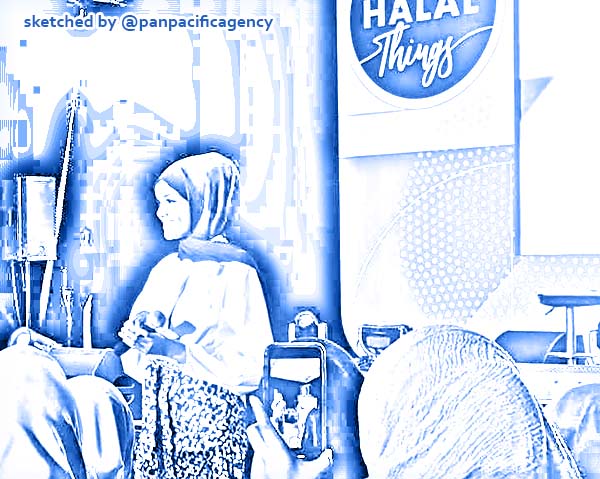[Analytics] Understanding Malaysia’s careful stance on Uyghur Muslims

American Muslim supermodel Halima Aden speaks at the Jakarta Halal Things festival at Senayan City, Jakarta, on Saturday. (JG Photo/Nur Yasmin). Sketched by the Pan Pacific Agency.
This fall, an exchange in the Malaysian parliament made explicit the country’s stance that it will not extradite any Uyghur refugees to China even if there is an official request from Beijing. Malaysia’s position may have been the result of domestic pressures, including popular demands for an end to China’s mass detention of Uyghur Muslims. Umair Jamal specially for the ASEAN Today.
The move shows that pressure from public on the issue remains a considerable threat for Malaysia’s leaders. Though Malaysia is attempting to walk a fine line between criticizing China and alienating its public, the strategy carries significant risks and may affect its relationship with Beijing.
In September, a statement from Mohd Redzuan Md Yusof, a minister in the Malaysian prime minister’s office, offered one of the first clear statements of Malaysia’s policy on not extraditing Uyghur refugees to China.
“If there are any Uyghur refugees who flee to Malaysia for protection, Malaysia has decided to not extradite Uyghur refugees even if there is a request from the People’s Republic of China,” said Mohd Redzuan.
“They are allowed to move on to a third country should they fear for their safety or potentially face persecution, where they feel they would not receive protection and justice in their home country,” he added.
In the past, Malaysia has defied China’s calls to extradite Uighur refugees. In 2018, Malaysia freed 11 Uyghurs from prison and sent them to Turkey despite an extradition request from China.
For years, Uyghurs Muslims fleeing China have used Malaysia to reach other countries, particularly Turkey. Between 2010 and 2016, as many as 10,000 Uyghurs reached Turkey via Southeast Asia. Zachary Abuza, professor of Southeast Asian studies at the National War College in the US, says that Malaysia “has long been an important node in the underground railway for Uyghurs seeking to escape to Turkey.”
Uyghurs, the indigenous Muslim population living mostly in the western Chinese region of Xinjiang, have long suffered under Beijing. The United Nations has called the region of Xinjiang a “no-rights zone”.
Reports indicate that China has subjected Uyghur Muslims to one of the worst and most invasive surveillance regimes in the world. Uyghurs outside of China attempted to bring a case at the International Criminal Court (ICC) accusing Beijing of genocide and crimes against humanity, but the case was dismissed as China is not a signatory to the ICC.
However, the majority of Muslim countries have turned a blind eye to the issue due to fears of economic and political reprisal from China.
Much of the Malaysian public has long voiced support for Uyghurs in China. The issue has been gaining traction in the country for years.
Last year, hundreds of people marched to the Chinese embassy in Kuala Lumpur, demanding an end to what they called Beijing’s mass detention of Uyghur Muslims.
An influential preacher in Malaysia called in December 2019 for a boycott of Chinese products over the repression of Uyghurs. Mohd Asri bin Zainul Abidin, the top Islamic jurist in Malaysia’s Perlis state, told Al Jazeera, “We need to go to the extent of boycotting China’s products. They know the strength of our purchasing power.”
“The decision should be taken at the highest level of Muslim countries and the ulama [religious scholars and guardians]” to address the Uyghur issue, Mohd Asri told Al Jazeera. “We should do something, because they [Uyghurs] are our brothers and sisters,” he added.
In what appears to be a move to appease domestic pressure, Malaysia last year announced a partnership with an international institute to study China’s human rights violations against Uyghur Muslims.
Malaysia’s foreign Minister, Saifuddin Abdullah, said in a statement that the International Institute of Islamic Thought and Civilization (ISTAC) will prepare a detailed report on the situation.
“Malaysia will neither blindly support any reports provided by the Chinese government nor openly criticize China,” Saifuddin told the New Straits Times.
For years, Malaysia’s refusal to expel Uyghur refugees has infuriated the Chinese government.
However, it is clear that Malaysia has still tried to walk a fine line between angering China and alienating its own population. For instance, in 2018, Beijing “resolutely opposed” then-premier Mahathir Mohamad’s decision to release 11 Uyghurs. Mahathir said that the 11 men had “done nothing wrong” in Malaysia. In 2019, Mahathir said in an interview with Turkish state-owned news outlet TRT World that criticizing China over its treatment of Uyghur Muslims “would not achieve anything.”
“We do what we can. We don’t knock our heads against a stone wall simply because it is there,” Mahathir said.
Last year, Malaysia’s former Islamic affairs minister, Mujahid Yusof Rawa, faced criticism after calling China’s Uyghur internment camps “training centers”. He was also criticized for saying reports of Muslim oppression in China were “false news”.
In 2019, Malaysia refused to sign a letter to the UN High Commissioner for Human Rights that condemned China’s mass detention of Uyghurs.
Malaysia’s current policy on Uyghur issues shows that the country is not interested in openly targeting China over the issue but is still trying to do enough to meet the public’s expectations.
However, it’s still not clear how Malaysia’s stance will shape Beijing’s policies towards the Southeast Asian nation in the long run.